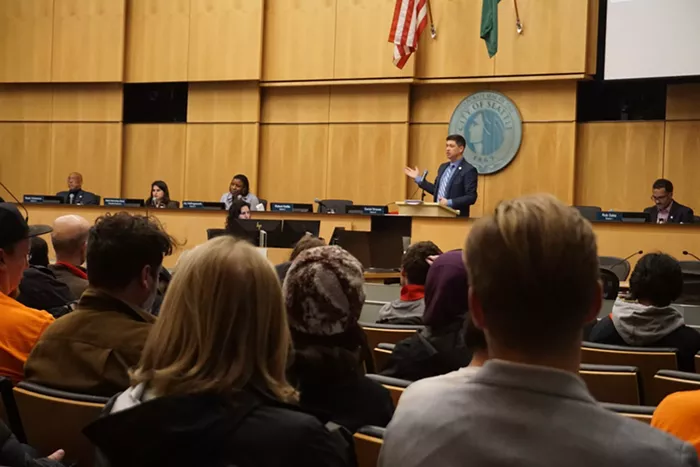This post was originally published on this site
Katie Wilson is likely Seattle’s next mayor, but for now, we still have a Bruce Harrell administration and a Sara Nelson-led City Council, and these folks are making big budget moves.
On Thursday, more than 200 people took a break from election-induced nail-biting to speak at the last City Council budget hearing, pleading for a slice of next year’s proposed $8.9 billion budget. While speakers requested funding for everything from food access to community revitalization, the majority of the public commenters were concerned about housing and homelessness.
When Harrell first announced his budget, he (and his campaign) touted an “historic” $350 million investment in housing. That’s technically true—it beat last year’s budget by $1 million. But according to The Urbanist’s calculations, if we adjust for inflation, funding for the Office of Housing is down.
The overall picture is more complicated. Funds for homelessness and housing affordability are spread across several departments and hidden within dozens of line items. The Human Services Department (HSD) gets the majority of the homelessness funds. Of their $432.4 million budget (a 12.3 percent increase from 2025), about $225 million goes to homeless services, making up a whopping 75 percent of the citywide homelessness budget in 2026. HSD provides $11.5 million for rental assistance programs.
On Thursday night, City Hall was packed for the last public budget hearing. Nearly every seat was taken. People were sitting on the floor. I was sitting on the floor. Earlier that day, they packed a virtual meeting room.
All told, more than 200 people spoke, and all had roughly 90 seconds to ask the City to protect their slice of the budget.
Mackenzie Lew, a legal assistant with the Housing Justice Project, urged the council to fully reinstate the tenant services allocation. Originally, Harrell’s proposal put $1 million toward the Seattle Department of Construction and Inspections (SDCI) for these services, but the balancing package halved that. Lew said that’s the bare minimum of what’s needed to prevent services from crumbling.
Representatives from other tenant services organizations—such as Be:Seattle, the Low Income Housing Institute, and the Seattle Human Services Coalition—spoke in support of reinstating Harrell’s original $1 million allocation.(For comparison: Harrell allotted $1.08 million to fund inspectors for unlicensed street food vendors.)
Cecilia Black, a Be:Seattle board member, which serves people with disabilities, said her organization “helped renters navigate reasonable accommodations and difficult relationships with landlords that helped keep people in their housing and prevent evictions.”
Harrell’s original HSD budget allocated $4 million for rental assistance and $527,000 for eviction legal defense, which Council left alone.
Unhoused residents and representatives for Tent City 3 and 4 made an appearance at the evening session, though programs like theirs are not listed in the budget nor the balancing package. They spoke at budget hearings in October, too. It’s a public venue where they can plead for help.
Their 200 residents are at great risk of being imminently displaced. Run by SHARE/WHEEL, the self-managed Tent City 3 and 4 have temporary host agreements with churches and nonprofits. Their current agreement is up on Saturday, November 15.
“Without shelter, people die,” said SHARE/WHEEL board member Anitra Freeman. “Create more shelter for the people on the street, and save the shelter that the people on the street have already created for themselves.”
There’s no dedicated funding for their community this year, though they have received some in previous budgets. The only remotely related line items are the $4.05 million dedicated to the Community Solutions Unsheltered Homelessness Pilot and a few general “outreach and shelter navigation” contracts through HSD, but those go to larger service providers.
Commenter Abel Mendoza urged the Council not to move another local homeless encampment. He ended his comment period with a statement that seemed almost resigned, as if accepting an unfavorable fate:
“All I can say is that our future is in your hands, and there’s nothing else I can say. Regardless of what I say, it’s always your decision, and not the decision of the public in general.”
City Council will make its final vote as the Budget Committee on November 20. It will make its final vote as City Council the next day.
